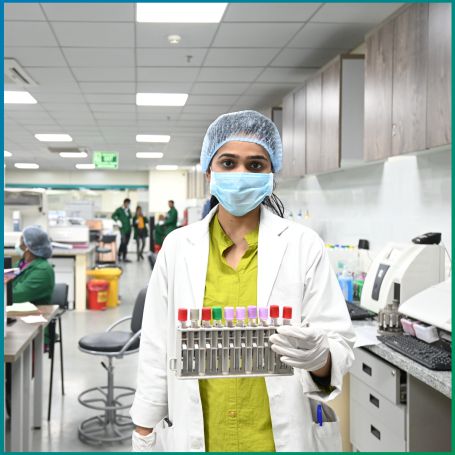
Anti-Thyroglobulin Antibody is a blood test that detects antibodies against thyroglobulin, a protein produced by the thyroid gland.


Anti-thyroglobulin antibody (Anti-TgAb) binds to thyroglobulin, disrupting the function of the thyroid gland and potentially leading to thyroid dysfunction. Testing for Anti-TgAb is important because it helps to assess whether an individual’s thyroid issues may stem from an autoimmune condition. This test is often ordered alongside other thyroid antibody tests, such as Anti-Thyroid Peroxidase Antibody (Anti-TPO), to provide a more comprehensive picture of thyroid health.
Elevated Anti-Thyroglobulin Antibody levels can be triggered by a few primary causes, including:
Hashimoto’s Thyroiditis: In this condition, the immune system attacks the thyroid, causing an increase in Anti-TgAb levels and often leading to hypothyroidism.
Graves’ Disease: This autoimmune disease results in hyperthyroidism, and high Anti-TgAb levels are common.
Thyroid Cancer Monitoring: In some cases, the Anti-TgAb test is used for monitoring thyroid cancer recurrence, as levels may change post-treatment.
Other Autoimmune Conditions: Rheumatoid arthritis and systemic lupus erythematosus can occasionally cause elevated Anti-TgAb, even if thyroid function is normal.
An Anti-Thyroglobulin Antibody test may be recommended for individuals who:
Have signs or symptoms of thyroid dysfunction, such as weight changes, fatigue, or mood changes. Have a family history of thyroid or other autoimmune diseases. Are undergoing treatment for thyroid cancer, as Anti-TgAb levels can help monitor treatment response. Shows abnormal thyroid function in blood tests and needs further investigation for potential autoimmune thyroid disease.
You should choose Diagnopein for your ANTI THYROGLOBULIN ANTIBODY test because we are committed to providing high-quality diagnostic care in a clean and hygienic environment. Our center is equipped with advanced technology to ensure accurate and reliable test results, which are crucial for assessing this test. Diagnopein’s experienced staff is dedicated to handling tests with precision and care, offering you both expertise and comfort. We also offer affordable pricing, making essential health diagnostics accessible without compromising quality. For timely, professional, and affordable cardiac testing, Diagnopein is your trusted partner for your healthcare.
High levels often indicate an autoimmune response against the thyroid, typically associated with conditions like Hashimoto’s thyroiditis or Graves’ disease.
Generally, fasting is not required for this test. However, consult your healthcare provider for specific instructions.
Yes, levels can vary, particularly in response to changes in immune activity, thyroid function, or treatment.
Both are thyroid antibodies, but Anti-TgAb targets thyroglobulin, while Anti-TPO targets thyroid peroxidase, another thyroid enzyme. Testing both can provide a fuller picture of thyroid autoimmunity.
Having both antibodies increases the likelihood of autoimmune thyroid disease and may indicate Hashimoto’s thyroiditis.